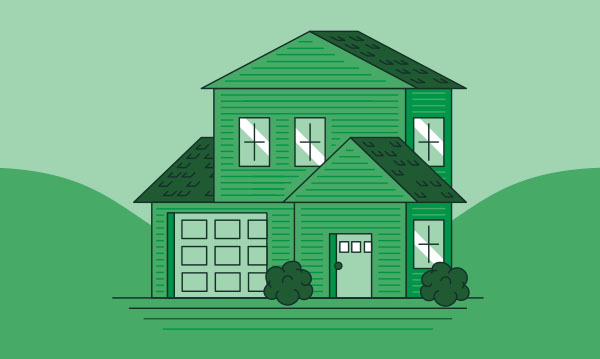NOTICE: Internet Explorer was retired by Microsoft on June 15th, 2022 and is no longer supported. This could change how you access Online Banking.
Making a Down Payment on a House

Everything You Need to Know About Making a Down Payment on a House
A lot goes into buying a home, but one of the biggest hurdles is saving for a down payment. It just takes the right planning, saving strategy and support from a loan officer you trust. Once you have everything you need, you’ll be able to secure a down payment and financing for your dream home.
What Is a Down Payment, and Why Do You Need One?
A down payment is a percentage of the home’s purchase price that you pay upfront. In other words, your down payment is the part of what you pay to buy a house that is not included in your loan amount. You’ll owe that certain percentage when you purchase the home, and it’s your initial equity investment. The larger your down payment, the better your chances for mortgage approval. Putting a larger amount down signals that you’re a lower risk to lenders. So you should start saving early by contributing small monthly amounts to a home savings account before deciding to buy a home.
How Much Should Your Down Payment Be for a House?
Your down payment amount is determined by the type of mortgage loan you choose, your budget and the lender you borrow from. A typical down payment is at least 10% of the purchase price. Ideally, you’ll want to put down 20% to avoid private mortgage insurance (PMI). If you put less than 20% down on a traditional mortgage, you’ll likely be required to purchase PMI. PMI protects the mortgage lender in case you are unable to make your payments.
If saving at least 10% doesn’t feel possible right now, programs run by the Federal Housing Administration (FHA) or the Department of Veterans Affairs (VA) can allow you to pay a smaller percentage or sometimes no down payment at all. WesBanco’s loan officers can help you determine if you’re eligible for these programs and guide you through any down payment assistance programs that you may qualify for. The U.S. Department of Housing and Urban Development or other local government organizations may have information on additional programs to help you save for your down payment.
Finding the Funds as a First-Time Homebuyer
Saving 20%, or even 10%, of your total mortgage is challenging, not to mention overwhelming. The first step is to reevaluate your budget. Make a specific goal to save for your down payment. Trim excess spending and dedicate those funds toward your goal instead. Saving to buy a house can help you prioritize budgeting and spending.
As a first-time home buyer, you can earn funds for your down payment faster through investments and high-interest savings accounts, but these options come with different levels of risk and reward. If you’re not planning to buy for several years, investing can be a good choice to build funds. You can put part of your money in mutual funds and stocks (higher risk, lower access) to try to earn more. These will give you a higher risk and lower access to your funds should you need them for an immediate expense, but typically greater returns. You can keep the rest in more conservative interest-bearing investments, such as savings accounts, certificates of deposit (CDs) or U.S. Treasury bills, where you don’t risk losing your investment.
How a Home Equity Line of Credit Helps Finance the Down Payment on a New Home
If you already own a home and hope to purchase a new one, you can help fund a new down payment with a home equity line of credit (HELOC). A HELOC leverages the equity in your home to secure a credit line for borrowing needs. At WesBanco, the Home Equity BridgeLine of Credit is designed to let you tap into the equity in your current home to purchase a new home. HELOCs help bridge the gap between buying and selling, allowing you to get into your forever home faster.
Funding a Down Payment With Family Gifts and Loans
How much of a down payment for a house can be gifted? If loved ones are willing to help you with a down payment, they can give you a tax-free gift up to the annual federal limit and can give your spouse an equal amount. If they want to give more than the federal limit, they’ll need to file IRS Form 709 to report the gift. They probably won’t need to pay a gift tax unless they are over their lifetime gift limit, which is usually several million dollars.
Taking a loan from family members is more complicated. If your loved one lends you $10,000 or less, and as long as you don’t invest these funds, you don’t have to worry about taxes. So, family loans may be best leveraged to cover a portion of your down payment. Lenders that loan more than $10,000 are required to charge interest that is at least equal to the applicable federal rate. They’re also required to pay taxes on that interest. Always review the current tax code before requesting loans from family members. The IRS has specific standards to comply with, so it’s important to keep records of everything for filing.
Need Help Setting Your Mortgage Budget?
Whether it’s your first home, next home or second home, having a budget for your down payment and mortgage is important. Check out our mortgage calculator below to help you determine the true cost of your home and how much down payment you need for a house.
Content is for informational purposes only and is not intended to provide legal or financial advice. The views and opinions expressed do not necessarily represent the views and opinions of WesBanco.
While we hope you find this content useful, it is only intended to serve as a starting point. Your next step is to speak with a qualified, licensed professional who can provide advice tailored to your individual circumstances. Nothing in this article, nor in any associated resources, should be construed as financial or legal advice. Furthermore, while we have made good faith efforts to ensure that the information presented was correct as of the date the content was prepared, we are unable to guarantee that it remains accurate today.
Source: Banzai Financial Literacy Curriculum. Neither Banzai nor its sponsoring partners make any warranties or representations as to the accuracy, applicability, completeness or suitability for any particular purpose of the information contained herein. Banzai and its sponsoring partners expressly disclaim any liability arising from the use or misuse of these materials and, by visiting this site, you agree to release Banzai and its sponsoring partners from any such liability. Do not rely upon the information provided in this content when making decisions regarding financial or legal matters without first consulting with a qualified, licensed professional.



